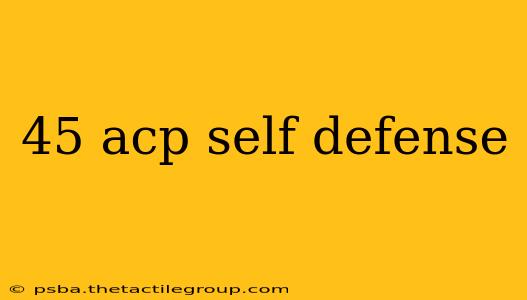The .45 ACP (Automatic Colt Pistol) cartridge holds a legendary status among handgun enthusiasts, often touted for its stopping power in self-defense situations. But is the .45 ACP the right choice for your self-defense needs? This in-depth guide will explore the pros and cons, helping you make an informed decision.
Understanding the .45 ACP's Ballistics
The .45 ACP is a relatively large cartridge, known for its substantial bullet diameter (.45 inches) and significant weight. This translates to impressive energy transfer upon impact, a key factor in stopping power. The larger diameter creates larger, more devastating wound channels, theoretically leading to faster incapacitation of a threat. However, it's crucial to understand that "stopping power" is a complex issue, influenced by many factors beyond just bullet size and energy.
Advantages of the .45 ACP for Self-Defense:
- High Stopping Power: The large bullet diameter and substantial weight contribute significantly to the perceived stopping power. The sheer size of the wound cavity created often leads to rapid incapacitation.
- Reliable Performance: The .45 ACP cartridge is a mature design with a proven track record of reliability, even in challenging conditions. This reduces the risk of malfunctions during a critical self-defense encounter.
- Wide Availability: Ammunition for the .45 ACP is readily available in various loads, including jacketed hollow points (JHPs) specifically designed for self-defense. JHPs expand upon impact, increasing the stopping power and reducing overpenetration.
- Effective at Close Range: The .45 ACP excels at close-range engagements, which are typical of many self-defense scenarios.
Disadvantages of the .45 ACP for Self-Defense:
- Recoil: The significant recoil associated with the .45 ACP can be challenging for some shooters, especially those with less experience or smaller builds. Strong recoil can impact accuracy and the ability to quickly follow up on shots.
- Magazine Capacity: Compared to smaller calibers like 9mm or .40 S&W, .45 ACP handguns typically have lower magazine capacities. This means fewer rounds available in a self-defense situation.
- Size and Weight: .45 ACP handguns tend to be larger and heavier than comparable handguns chambered in other calibers. This can make them less convenient to carry concealed.
- Cost: Ammunition for the .45 ACP can be more expensive than some other calibers.
Choosing the Right Self-Defense Handgun: Beyond Caliber
Selecting a self-defense handgun goes far beyond simply choosing a cartridge. Consider the following factors:
- Ergonomics: The handgun should fit comfortably in your hand and be easy to manipulate.
- Reliability: Choose a reputable manufacturer known for producing reliable firearms.
- Training: Consistent practice and proper training are crucial for effective self-defense with any firearm.
- Concealability: If you plan to carry concealed, choose a handgun that is easy and comfortable to carry discreetly.
- Legal Considerations: Familiarize yourself with your local laws and regulations regarding firearm ownership and carrying.
Conclusion: The .45 ACP in the Self-Defense Equation
The .45 ACP is a powerful cartridge with a proven track record, offering substantial stopping power. However, its significant recoil, lower magazine capacity, and larger size should be carefully considered. Ultimately, the best self-defense cartridge depends on your individual needs, physical capabilities, and training level. Thorough research, professional guidance, and extensive practice are essential before making a decision about a self-defense firearm. Always prioritize safety and responsible gun ownership.

